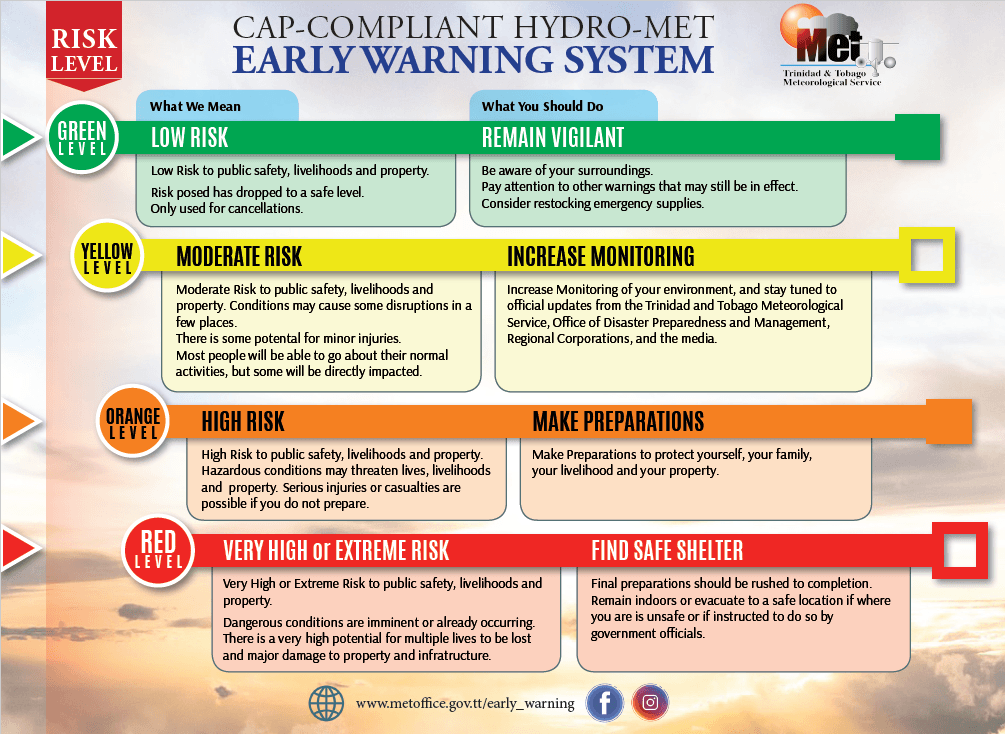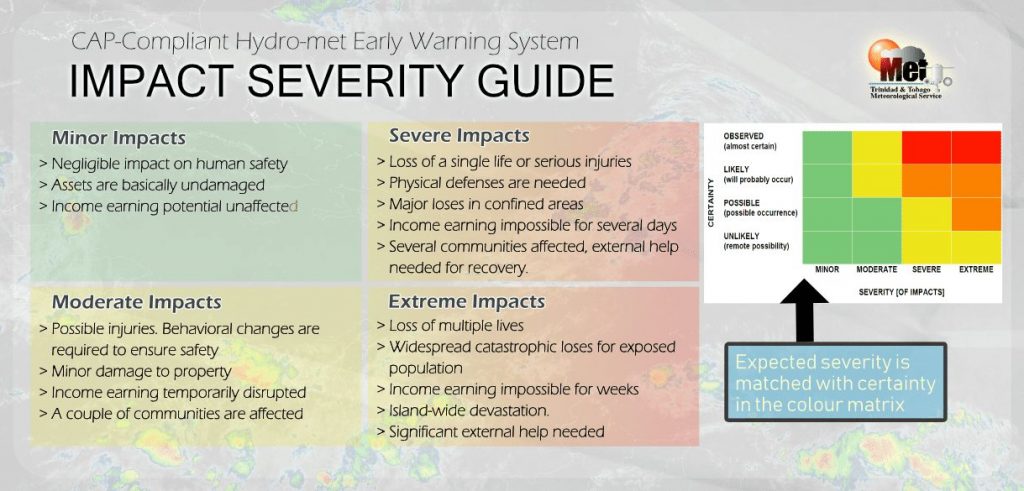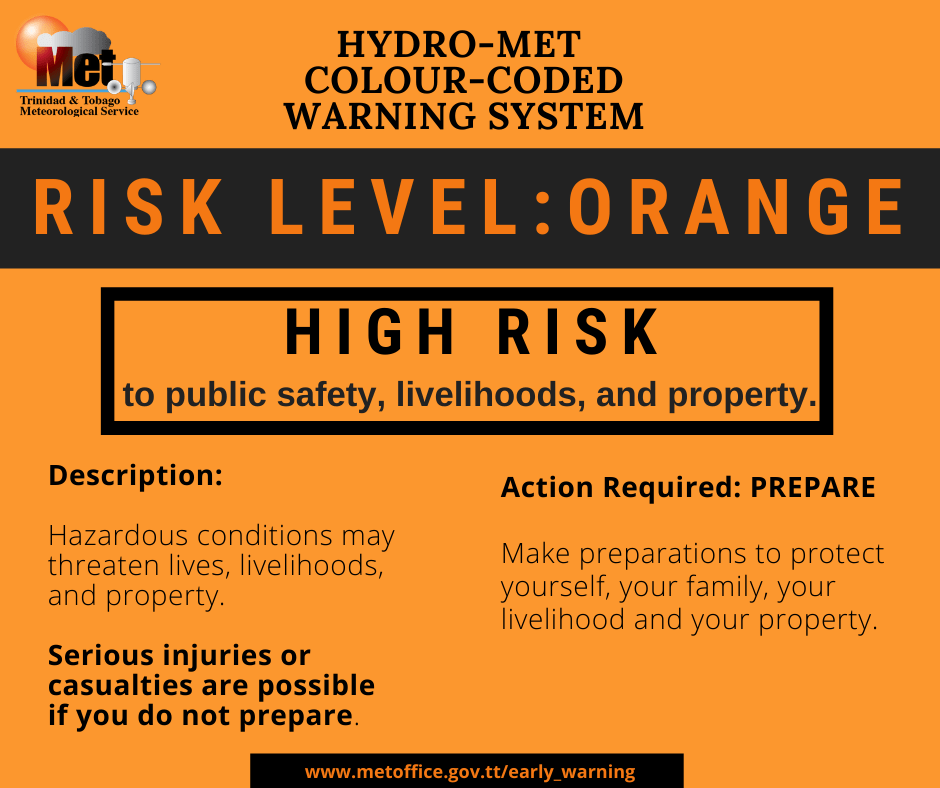As Hurricane Beryl continues to near the Windward Islands, a Tropical Storm Warning remains in effect for Trinidad, while a Hurricane Warning remains in effect for Tobago.
This warning is due to Hurricane Beryl, which is now a powerful Category 3 Hurricane with maximum sustained winds near 195 KM/H with higher gusts. As of 5:00 AM today, Hurricane Beryl was located near 11.7°N 59.9°W, approximately 93 kilometers northeast of Tobago, moving westward near 31 KM/H.
For Trinidad, according to the Trinidad and Tobago Meteorological Service, “This means there is a high potential for tropical storm conditions, including sustained winds of 63-118 KM/H, within the warning area over the next 7 hours,” as of 5:10 AM Monday.
What you need to know
— Rainfall: Through Thursday morning, across Trinidad, rainfall accumulations between 25 and 50 millimeters are likely, while across Tobago, accumulations between 25 and 75 millimeters are likely, with isolated totals favoring the northern half of Trinidad and Tobago exceeding 150 millimeters, particularly where feeder band activity develops.
— Hazards For Trinidad: A Tropical Storm Warning means that tropical-storm-force winds (63-118 km/h) are expected, in this case, within 7 hours. Several hazards are forecast. According to the TTMS, “Showers and/or thunderstorms can be accompanied by wind gusts exceeding 55 KM/H associated with Beryl’s outer bands.” Based on the current forecast model guidance, heavy rainfall, and stronger winds are likely to affect Trinidad in outer bands, mainly across the northern half of the island, from Sunday night through Monday afternoon. Locally intense rainfall is likely to produce street/flash flooding with frequent lightning in intense thunderstorm activity. Landslides are possible in elevated areas, particularly in northern Trinidad. Funnel cloud activity is possible on Monday afternoon across Trinidad.
— Marine: According to the TTMS, “There is currently a high chance (80%) of hazardous seas with large, battering waves. Mariners should expect wave heights to increase significantly, posing a danger to small craft and coastal and offshore activities. Strong currents and choppy seas will make navigation hazardous.” Hazardous conditions are possible in the Gulf of Paria from Monday through Tuesday, while northern and eastern waters are forecast to see rough seas from Sunday night through Tuesday morning, with waves as high as 5.0 meters.
Latest Alerts
TTMS Issues Adverse Weather Alert For T&T
Trinidad and Tobago is NOT under any tropical storm or hurricane threat, watch, or warning at this time.
The Tropical Storm Warning
The Trinidad and Tobago Meteorological Service maintains a Tropical Storm Warning for Trinidad and surrounding coastal waters at 5:10 AM Monday. According to the TTMS, this warning will remain in effect until 12:00 PM (noon) on Monday, July 1st, 2024.


“Trinidad is presently under a Tropical Storm Warning. This means there is a high potential for tropical storm conditions, including sustained winds of 63-118 KM/H, within the warning area over the next 7 hours. As of 5:00 AM, Hurricane Beryl was located near 11.9°N 59.9°W, approximately 93 KM northeast of Tobago, moving westward near 31 KM/H. There is currently a high chance (80%) of hazardous seas with large, battering waves. Mariners should expect wave heights to increase significantly, posing a danger to small craft and coastal and offshore activities. Strong currents and choppy seas will make navigation hazardous. Showers and/or thunderstorms can be accompanied by wind gusts exceeding 55 km/h associated with Beryl’s outer bands. The next update will be issued at 8:00 AM or earlier if necessary, “according to the Trinidad and Tobago Meteorological Service.
Why am I under a tropical storm watch or warning?
A tropical storm warning is an announcement that sustained winds of 34 to 63 knots (39 to 73 mph or 63 to 118 km/hr) are expected somewhere within the specified area within 36 hours in association with a tropical, subtropical, or post-tropical cyclone.
A tropical storm watch is an announcement that sustained winds of 34 to 63 knots (39 to 73 mph or 63 to 118 km/hr) are possible within the specified area within 48 hours in association with a tropical, subtropical, or post-tropical cyclone.
This specific watch or warning is based on the potential for experiencing tropical-storm-force winds alone, not the other hazards associated with a tropical storm (hazardous seas, torrential rainfall, etc.). This means if the system tracks close to your country, but the strongest winds remain offshore or north/east of your location, you may not be placed under a tropical storm watch or warning, but you may have other advisories in effect.

The color of the warning indicates the severity of the event and the probability of the event occurring. Currently, the warning level is orange. This means that the hazards are likely, and the severity of impacts is severe for this particular warning. For the island of Trinidad, the public should prepare for the hazards associated with strong winds and gusts of tropical-storm-force strength, street/flash flooding, frequent lightning in thunderstorms, and landslides. Seas will also become hazardous, and mariners should prepare for large waves in nearshore areas, particularly Atlantic-facing coastlines.
At an Orange Level, there is a high risk to public safety, livelihoods and property with hazardous conditions threatening lives, livelihoods, and property. According to the TTMS guidance on their Early Warning System, at this level, serious injuries or casualties are possible if you do not prepare.
The TTMS says severe impacts are possible. This means that conditions may result in the loss of a single life or serious injuries, physical defenses are needed, major losses in confined areas, and income earning impossible for several days, with several communities being affected. External help is needed for recovery.
The TTMS is advising the public in Trinidad to prepare for the possibility of tropical storm conditions and secure loose outdoor objects and livestock; marine interests should exercise extra caution during this period, with all marine vessels properly secured and anchored. The public should also monitor official news sources and weather updates.












